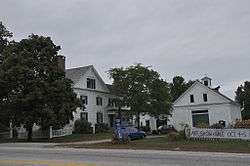Marrett House
The Daniel Marrett House is a historic house museum at 40 East Ossippee Trail (Maine State Route 25) in Standish, Maine. Built in 1789, it is a prominent local example of Greek Revival architecture, and was for many years owned by members of the Marrett family. In 1944 it was given to the Society for the Preservation of New England Antiquities (now Historic New England), which operates it as a museum today. The house was listed on the National Register of Historic Places in 1974.[1]
Daniel Marrett House | |
 | |
  | |
| Location | 40 Ossipee Trail East (ME 25), Standish, Maine |
|---|---|
| Coordinates | 43°43′55″N 70°33′5″W |
| Area | 1 acre (0.40 ha) |
| Built | 1789 |
| Architectural style | Greek Revival |
| Part of | Standish Corner Historic District (ID93001117) |
| NRHP reference No. | 74000314[1] |
| Significant dates | |
| Added to NRHP | February 15, 1974 |
| Designated CP | October 14, 1993 |
Description and history
The Marrett House is located in the village of Standish Corner, on the north side of the Ossippee Trail, just east of the junction with Maine State Route 35. It is a wood frame connected farmstead, with the main house in front, connected via a series of additions to a barn. The main block is 2-1/2 stories in height, with a side gable roof, central chimney, clapboard siding, and stone foundation. The front facade is five bays wide, with an entrance vestibule featuring flanking pilasters and a gabled pediment. The building corners are pilastered, and Greek Revival trim is continued on the ells and the barn.[2] The interior of the house retains most of its original finishes, and is decorated with Marrett family possessions, given with the house.
The house was built in 1789 by Benjamin Titcomb, and had at that time typical Federal period styling. It was acquired in 1796 by Daniel Marrett, a Harvard College graduate who moved to Standish to become the town parson. The house he purchased reflected his status as the community's leading citizen. Over the years, Marrett's children and grandchildren enlarged and updated the house but left many furnishings and interior arrangements unchanged as relics of the past. They preserved the southwest parlor exactly as it had appeared on the occasion of a family wedding in 1847. In 1889, the family celebrated the house's centennial by refurbishing several of the rooms with reproduction heirloom wallpapers and bed hangings, and organizing a large family reunion to honor the Marrett legacy.
The house was used to safeguard gold from banks in Portland during the War of 1812.[3]
In 1944, the house was given by Daniel Marrett's descendants to Historic New England.[2] The house is open to the public for guided tours on the first and third Saturday of the month, June though October 15.
References
| Wikimedia Commons has media related to Marrett House. |
- "National Register Information System". National Register of Historic Places. National Park Service. July 9, 2010.
- "NRHP nomination for Marrett House". National Park Service. Retrieved 2016-01-06.
- "Maine Local Government - Town of Standish". Archived from the original on 2006-12-15. Retrieved 2007-01-14.
External links
- Historic New England website on the house
- "Daniel Marrett House Museum". Geographic Names Information System. United States Geological Survey. Retrieved 2009-05-03.